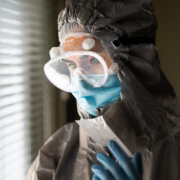A prescription for surviving COVID-19 nutritionally intact: eat well, get sunshine

By Nailah John, Linda Golodner Food Safety and Nutrition Fellow
Overeating or eating poorly during this pandemic is understandable. However, a healthy diet is vital for you and your family’s health. As most people are aware, a healthy diet consists of protein, fruits, vegetables, and grains and is low in salt, unsaturated fats, and free sugars. But there’s more to it than that.
While it’s important to have protein in one’s diet, it is not always necessary to get protein from meat products. One of the best sources is legumes (as known as beans) such as white peas, kidney beans, moong, masoor, chickpeas, lentils, and many others according to Thrive Global. Consider whipping up a salad, making tasty lentil soup with carrots and cilantro, or a chickpea curry to quench your taste buds! Preparing a simple, easy, and delicious meal doesn’t have to be hard, you can find many recipes and cooking guides on YouTube or Google Search.
Eating healthy sometimes means breaking bad habits, so the first step is by keeping healthy and nutritious snacks around, such as cheese with an apple, hummus and carrots, or nuts and dried fruit. Eating yogurt once a day is a good habit to get into along with fruit and cereal. If you’re full from a good breakfast, you are less likely to snack on junk food. Thrive Global noted that certain bacteria are highly recommended to keep you healthy and fit.
Remember to top up on your fruits! They are a rich source of minerals and vitamin C, which is especially good for boosting your immune system during COVID-19. Rangers, Apples, kiwis, and persimmons are just a few fruits rich in vitamin C. Kale, brussels sprout, broccoli, and parsley are also on the list. Vitamin D is also important in the immune response to COVID-19 due to its anti-inflammatory properties. Vitamin D is usually sourced by the action of sunlight on the body but since many of us are staying at home due to the lockdown and unable to get the necessary daily exposure, we must depend on vitamin D rich food sources such as; salmon, swordfish, oysters, mushrooms, and eggs, according to 10FAQ Health. And these vitamin D rich foods can make for very delicious dishes like garlic butter baked salmon or chargrilled oysters. Check out recipe sites like Food Network for more meal ideas.
Eating healthy is particularly important during the time of COVID-19. By incorporating foods of color—carrots, beans, various cheeses, kale, and more—you can make delicious dishes. Try new recipes and enjoy a healthy nutritious meal. And remember, eating healthy contributes to the boosting of the immune system. Let us all try to stay healthy and safe during COVID-19!
















